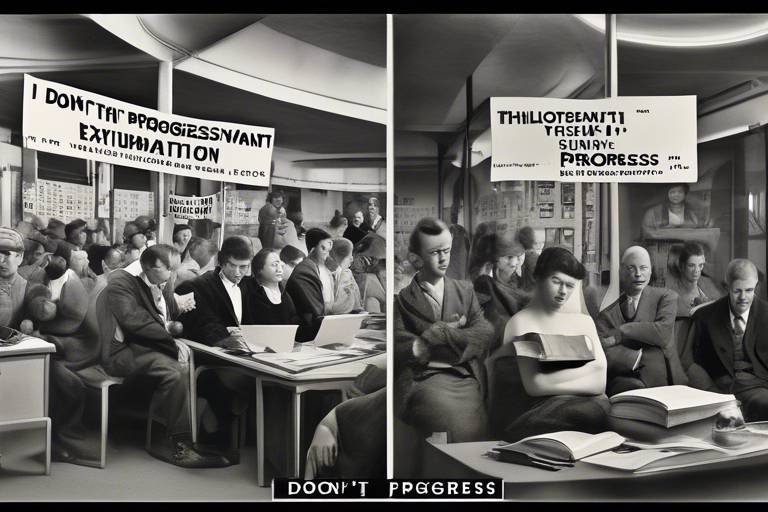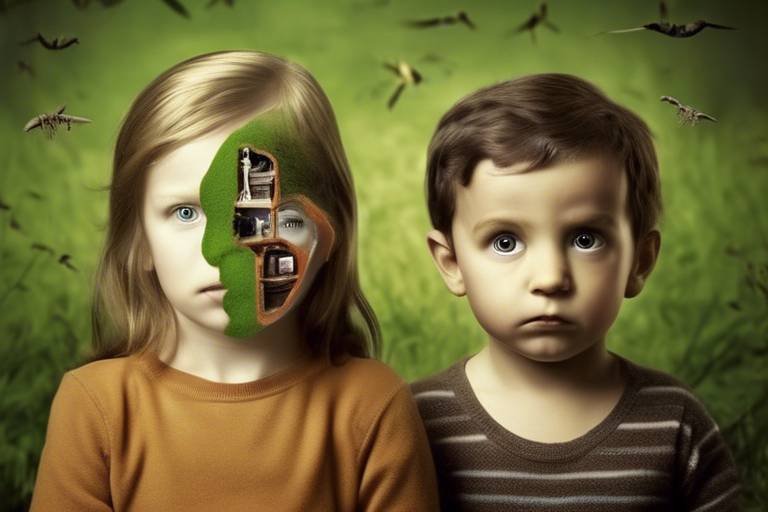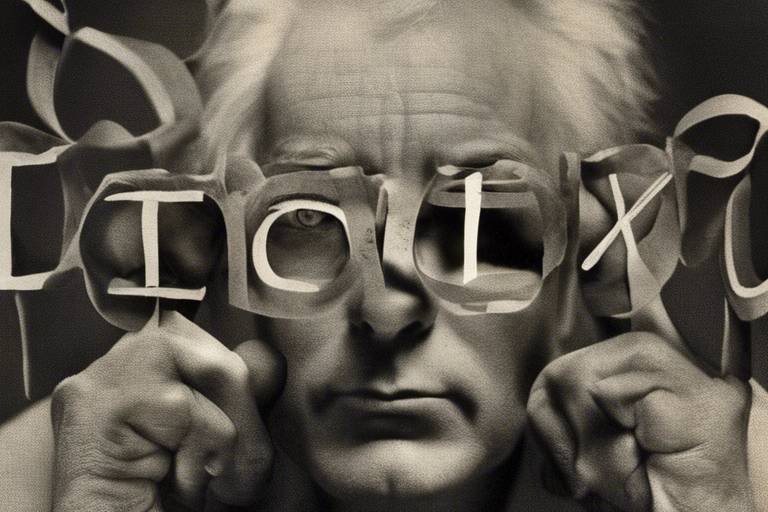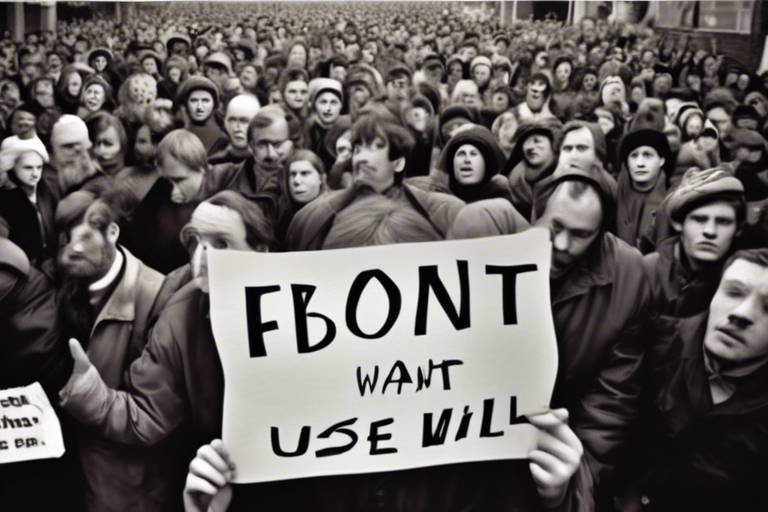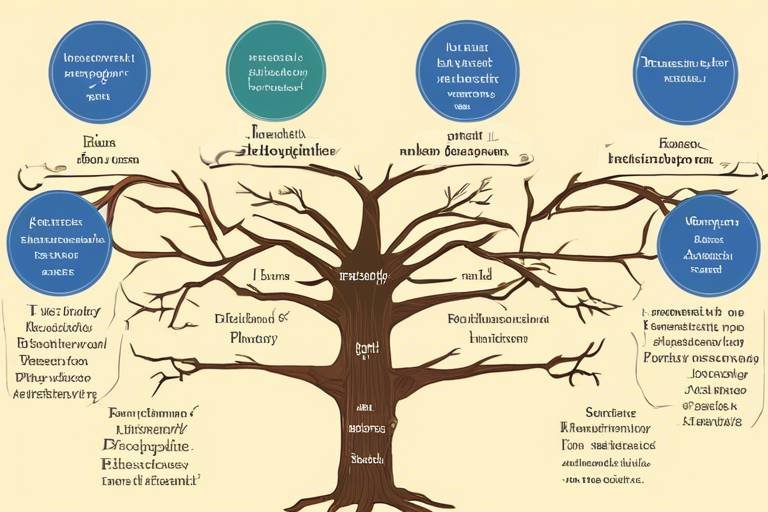What Does Being 'Woke' Mean? A Philosophical Analysis
The term 'woke' has evolved into a powerful buzzword in our contemporary lexicon, often sparking debates and discussions that can ignite passion on both sides of the aisle. But what does it truly mean to be 'woke'? At its core, being woke signifies a heightened awareness of social injustices, particularly those related to race, gender, and class. It’s not just a trendy term; it’s a call to action, urging individuals to recognize and challenge systemic inequalities that have persisted throughout history. But how did we get here? What philosophical underpinnings support this concept, and why does it matter so much in our current societal climate?
To understand 'wokeness,' we must delve into its historical roots. The term emerged from African American Vernacular English (AAVE) and was initially used to describe a state of being alert to social and political injustices. Over time, it has transcended its original context, becoming a broader term that encompasses various movements advocating for social justice. This journey from a colloquial expression to a widespread cultural phenomenon reflects a significant shift in societal consciousness, pushing us to confront uncomfortable truths about our world.
Philosophically, wokeness is intertwined with concepts of social justice and critical theory. These frameworks encourage individuals to scrutinize the structures that perpetuate inequality. Critical theory, for instance, challenges the status quo by questioning the power dynamics at play in society. It invites us to examine our roles within these systems and to consider how our actions (or inactions) contribute to the perpetuation of injustice. This philosophical lens is essential for understanding the depth and breadth of what it means to be woke.
Moreover, the notion of intersectionality plays a crucial role in the discourse surrounding wokeness. Coined by scholar Kimberlé Crenshaw, intersectionality emphasizes the interconnectedness of various social identities, such as race, gender, sexuality, and class. This concept is vital in understanding how different forms of oppression overlap and affect individuals uniquely. For example, a Black woman may face different challenges than a white woman or a Black man, highlighting the importance of considering multiple identities when addressing social issues. This nuanced understanding fosters empathy and broadens the scope of activism.
Being woke also carries ethical implications. It demands a commitment to not only being aware of injustices but also to taking action against them. This ethical responsibility can manifest in various ways, from educating oneself and others to participating in activism and advocacy. It raises important questions: Are we merely passive observers of injustice, or are we willing to engage actively in the fight for equality? The moral weight of being woke lies in the choices we make and the actions we take in response to our awareness.
However, the concept of wokeness is not without its critiques. Critics argue that it can lead to performative activism, where individuals engage in social justice efforts for the sake of appearances rather than genuine commitment. This performative aspect can create a divide, fostering an environment where people feel they must constantly prove their wokeness, leading to accusations of divisiveness rather than unity. It’s a complex landscape, and the debates surrounding it often reflect deeper societal tensions.
As we navigate this intricate web of ideas and beliefs, it’s essential to recognize the impact of wokeness on society as a whole. From politics to popular culture, wokeness has become a significant force shaping public discourse. It influences everything from educational curricula to media representation, urging us to reconsider long-held narratives and embrace a more inclusive perspective. The question remains: how do we harness the power of wokeness for positive change without falling into the pitfalls of divisiveness?
- What is the origin of the term 'woke'? - The term 'woke' originated from African American Vernacular English and initially referred to being aware of social injustices.
- How does intersectionality relate to wokeness? - Intersectionality examines how various identities intersect, affecting individuals' experiences with oppression and privilege.
- What are some criticisms of wokeness? - Critics argue that wokeness can lead to performative activism and may create divisions among people instead of fostering unity.
- Why is being woke important? - Being woke encourages awareness and action against injustices, promoting social change and fostering empathy among individuals.

Historical Context of 'Woke'
Understanding the historical origins of the term 'woke' is essential for grasping its current usage. The term itself has roots in African American Vernacular English (AAVE), where it originally meant being alert to social injustices, particularly those affecting the Black community. Its earliest known usage can be traced back to the 1940s, when it appeared in a song by the folk singer Lead Belly, who urged listeners to “stay woke” in the context of racial inequality and civil rights.
The civil rights movements of the 20th century played a crucial role in shaping the meaning of 'woke.' Activists fought against systemic racism, police brutality, and economic inequality, bringing awareness to the struggles faced by marginalized groups. The term began to gain traction during the 1960s and 1970s, aligning itself with the broader fight for social justice. In this period, being 'woke' was not just about awareness; it was about taking action against oppression.
Fast forward to the 21st century, and 'woke' has evolved into a cultural phenomenon. The rise of social media has amplified discussions around social justice issues, allowing the concept of being woke to reach a global audience. Today, it encompasses a wide range of topics, including gender equality, LGBTQ+ rights, and environmental justice. However, this expansion has also led to differing interpretations of what it means to be 'woke.'
As we explore the historical context of 'woke,' it's important to consider how societal changes have influenced its meaning. The term has often been used in various movements, each adding layers to its significance. For instance, the Black Lives Matter movement has brought renewed attention to issues of racial inequality, while the #MeToo movement has highlighted gender-based violence and harassment. Each of these movements has contributed to a broader understanding of social justice, making the term 'woke' a powerful rallying cry for change.
Moreover, the commercialization of wokeness has sparked debates about its authenticity. Some argue that corporations and individuals are adopting 'woke' rhetoric for profit or social clout, leading to accusations of performative activism. This raises questions about the true meaning of being 'woke' and whether it can be co-opted by those who do not genuinely support the underlying causes.
In summary, the historical context of 'woke' reveals a complex interplay of social movements, cultural shifts, and evolving definitions. As we continue to navigate the implications of wokeness in our society, it is essential to remain aware of its origins and the struggles that have shaped its meaning. Understanding this context not only enriches our comprehension of the term but also informs our engagement with the ongoing fight for justice and equality.

Philosophical Foundations of Wokeness
To truly grasp the essence of being woke, one must delve into its philosophical underpinnings. Wokeness is not merely a trend or a buzzword; it is rooted in a complex web of ideas that advocate for social justice and challenge existing power structures. At its core, wokeness embodies a heightened awareness of societal inequalities and a commitment to addressing them. This consciousness is influenced by various philosophical movements, primarily critical theory and social justice theories, which provide the framework for understanding the dynamics of oppression and privilege in our society.
Critical theory, originating from the Frankfurt School in the early 20th century, emphasizes the need to critique and change society rather than merely understand it. It invites individuals to question the status quo and examine how cultural and societal norms perpetuate inequality. The critical theorists argued that traditional theories often ignored the experiences of marginalized groups, thus failing to address the root causes of social injustice. This perspective is essential in the context of wokeness, as it encourages individuals to challenge dominant narratives and recognize the complexities of social issues.
Moreover, the concept of social justice plays a pivotal role in shaping wokeness. Social justice advocates for the fair distribution of resources and opportunities, emphasizing the importance of equity in all aspects of life. It challenges systemic inequalities based on race, gender, sexuality, and class, pushing for a society where everyone has a voice. In this light, being woke means actively engaging in the fight for social justice and recognizing the interconnectedness of various forms of oppression.
The intersection of critical theory and social justice creates a powerful lens through which we can analyze and understand wokeness. Critical theory provides the tools to deconstruct societal norms, while social justice offers a vision for a more equitable world. Together, they inspire a collective consciousness that seeks to dismantle oppressive structures. For instance, consider the following aspects:
- Awareness: Recognizing the existence of systemic injustices.
- Engagement: Actively participating in movements that promote equity.
- Solidarity: Standing with marginalized communities in their struggles.
These elements are vital for anyone identifying as woke, as they foster a deeper understanding of the societal landscape and the various forces at play. This philosophical foundation encourages individuals to not only be aware of injustices but also to take action against them, creating a ripple effect of change in their communities.
Another crucial aspect of wokeness is intersectionality, a term coined by legal scholar Kimberlé Crenshaw. Intersectionality highlights how different social identities—such as race, gender, and class—interact and overlap, leading to unique experiences of oppression. This concept is significant because it acknowledges that the fight for social justice is not one-dimensional; rather, it is multifaceted and requires a nuanced understanding of how various forms of discrimination intersect.
For example, a Black woman may face discrimination not only because of her race but also due to her gender. Recognizing these intersections is vital for developing effective strategies to combat inequality. Thus, wokeness encourages individuals to adopt an intersectional approach, ensuring that all voices are heard and considered in the quest for justice.
The ethical implications of being woke extend beyond mere awareness; they encompass a commitment to action. This moral responsibility involves not only acknowledging injustices but also actively working towards dismantling them. Wokeness calls for a proactive stance against oppression, urging individuals to challenge discriminatory practices and advocate for change in their communities. This ethical dimension is what separates genuine activism from performative gestures, emphasizing the need for sustainable and meaningful engagement.
In conclusion, the philosophical foundations of wokeness are deeply intertwined with critical theory and social justice. They provide a framework for understanding the complexities of oppression and the ethical responsibilities that come with being aware. As we navigate a world rife with inequalities, embracing these philosophical principles can inspire us to create a more just and equitable society.
- What does it mean to be woke? Being woke refers to a heightened awareness of social injustices and a commitment to addressing them.
- How did the term 'woke' originate? The term originated from African American Vernacular English (AAVE) and gained prominence during the civil rights movements.
- Why is intersectionality important in discussions about wokeness? Intersectionality recognizes that individuals experience oppression differently based on their multiple social identities.
- What are the critiques of wokeness? Critiques of wokeness often focus on accusations of performative activism and divisiveness in social movements.

Critical Theory and Social Justice
At its core, critical theory serves as a powerful tool for examining the complexities of social structures and the injustices embedded within them. Originating from the Frankfurt School in the early 20th century, critical theory challenges the status quo, urging us to question the very foundations of our societal norms and values. This philosophical approach is intertwined with the concept of social justice, which advocates for equitable treatment and opportunities for all individuals, particularly those who have historically been marginalized.
Critical theory posits that societal issues are not isolated incidents but are instead symptomatic of larger systemic problems. It encourages us to look beyond individual actions and examine the broader social, political, and economic contexts that perpetuate inequality. For instance, consider how issues like racism, sexism, and classism are often interlinked. By acknowledging these connections, critical theory advocates for a more nuanced understanding of oppression. This perspective aligns closely with the principles of social justice, which seek to dismantle these interconnected systems of power and privilege.
In practical terms, the application of critical theory can be seen in various movements advocating for social change. Activists and thinkers utilize critical theory to analyze and challenge oppressive practices within institutions, whether in education, law, or healthcare. By doing so, they aim to create a more just society where every individual’s rights are recognized and upheld. For example, movements like Black Lives Matter and #MeToo have employed critical theory to expose the systemic injustices faced by marginalized groups, highlighting the urgent need for reform.
Moreover, critical theory encourages a reflective practice among individuals. It prompts us to question our own beliefs and biases, fostering a sense of awareness that is essential for genuine engagement with social justice issues. This self-reflection is crucial, as it allows individuals to understand their positions within societal hierarchies and to recognize the privileges they may hold. Such awareness is not merely an academic exercise; it is a call to action, urging individuals to leverage their privileges to advocate for those who are less fortunate.
In summary, the interplay between critical theory and social justice is vital for understanding the complexities of societal issues. By employing critical theory, we can uncover the deep-seated injustices that plague our world and work towards meaningful change. This philosophical framework not only enriches our understanding of social dynamics but also empowers us to take action in pursuit of a more equitable future.
- What is critical theory? Critical theory is an approach that seeks to understand and critique the social structures and power dynamics that contribute to inequality and injustice.
- How does critical theory relate to social justice? Critical theory provides a framework for analyzing social injustices and advocates for systemic change to create a more equitable society.
- Can critical theory be applied in everyday life? Yes, individuals can use critical theory to reflect on their own biases and privileges, fostering awareness and encouraging advocacy for social justice.
- What are some examples of movements influenced by critical theory? Movements such as Black Lives Matter and #MeToo utilize critical theory to highlight systemic injustices and advocate for change.

Intersectionality in Wokeness
When we dive into the concept of intersectionality, we're essentially peeling back the layers of identity and understanding how they intertwine to shape our experiences. Imagine a tapestry where each thread represents a different aspect of our identity—race, gender, class, sexuality, and more. Each thread is distinct, yet they all come together to create a complex picture of who we are. This is the essence of intersectionality, and it plays a pivotal role in the broader conversation about being woke.
At its core, intersectionality acknowledges that individuals do not exist in isolation. Instead, we are influenced by multiple, overlapping identities that can lead to unique experiences of oppression or privilege. For instance, a black woman may face challenges that are different from those encountered by a white woman or a black man. This is crucial because it highlights how wokeness isn't just about recognizing one form of injustice; it's about understanding the interconnected nature of various social injustices.
In the realm of social justice, intersectionality provides a framework for activists and thinkers to address issues holistically. It encourages us to ask questions like, "How does race intersect with gender in this context?" or "What about the impact of socioeconomic status?" By doing so, we can better understand the systemic barriers that individuals face, which might be invisible if we only focus on one aspect of identity.
To illustrate this further, consider the following table, which outlines different intersections of identity and their potential impacts:
| Identity Aspect | Potential Impact |
|---|---|
| Race | Access to education, employment opportunities, and social services may vary widely. |
| Gender | Experiences of sexism and gender-based violence can differ significantly. |
| Class | Economic status can dictate access to healthcare, housing, and legal protection. |
| Sexual Orientation | Members of the LGBTQ+ community may face discrimination that compounds other forms of oppression. |
This table demonstrates how each identity aspect can uniquely shape an individual's experience. By understanding these intersections, we can foster a more inclusive and effective social justice movement. In essence, being woke means recognizing that our fight for equality must address all layers of identity, not just the most visible ones.
Furthermore, the concept of intersectionality encourages empathy and solidarity among different social groups. When we grasp how various forms of oppression intersect, we can better support one another in our collective struggle for justice. It's not just about advocating for one cause; it's about standing together against all forms of inequality. This interconnected approach can lead to more comprehensive solutions and a deeper understanding of the societal structures that perpetuate injustice.
In conclusion, intersectionality is a vital component of wokeness, as it enriches our understanding of social dynamics and the complexities of human experience. Embracing this concept allows us to engage more thoughtfully in discussions about justice and equity, ultimately paving the way for a more inclusive society.
- What is the main idea behind intersectionality?
Intersectionality is the understanding that various aspects of a person's identity intersect and contribute to their unique experiences of oppression or privilege. - How does intersectionality relate to being woke?
Being woke involves recognizing and addressing the interconnected nature of social injustices, which is central to the concept of intersectionality. - Why is intersectionality important in social justice movements?
It ensures that all voices are heard and that solutions address the complexities of people's experiences, leading to more effective advocacy and change.

Ethics of Awareness
Being 'woke' is not just a trendy catchphrase; it represents a profound ethical commitment to understanding and addressing social injustices that permeate our society. At its core, the ethics of awareness demands that individuals not only recognize the inequalities and systemic issues around them but also take meaningful action in response. This awareness is akin to shining a light into the dark corners of our social structures, illuminating biases and injustices that often go unnoticed. But what does it truly mean to be ethically aware?
The journey towards ethical awareness involves several critical components. First, it requires a deep sense of empathy. To truly grasp the experiences of marginalized groups, one must engage in active listening and seek to understand their perspectives. This is not merely about acknowledging their struggles; it’s about feeling their pain and recognizing their humanity. It’s like stepping into someone else’s shoes and walking a mile in them—only then can we appreciate the weight they carry.
Moreover, ethical awareness calls for critical reflection. It's essential to question our own beliefs, privileges, and biases. This self-examination can be uncomfortable, as it often reveals the privileges we may take for granted. For instance, consider the following questions:
- How do my social identities shape my worldview?
- In what ways have I benefited from systemic inequalities?
- Am I willing to challenge my own comfort for the sake of justice?
These questions aren't easy to answer, but they are crucial in fostering an authentic woke consciousness. The act of questioning leads to a deeper understanding of our roles in perpetuating or dismantling oppressive systems.
Furthermore, the ethics of awareness extends beyond individual reflection; it encompasses a collective responsibility. When we become aware of injustices, we are ethically obligated to act. This can manifest in various forms, such as advocating for policy changes, supporting marginalized communities, or simply engaging in conversations that challenge the status quo. It’s about transforming awareness into action, akin to a ripple effect—each small action can contribute to a larger wave of change.
However, it’s important to note that the commitment to being woke is not without its challenges. There’s a fine line between genuine activism and performative wokeness, where individuals may engage in activism for the sake of appearance rather than authentic change. This performative aspect can dilute the ethical foundation of awareness, leading to skepticism and backlash against the movement itself.
In conclusion, the ethics of awareness demands a holistic approach to understanding and addressing social injustices. It requires empathy, critical reflection, and a commitment to action. By embracing these principles, individuals can contribute to a more equitable society, fostering a culture of awareness that transcends superficial engagement. The journey may be challenging, but it is a necessary path towards achieving true social justice.
- What does it mean to be 'woke'? Being 'woke' refers to being aware of social injustices, particularly those related to race, gender, and class, and actively seeking to address them.
- Is being woke a political stance? Yes, being woke often involves political activism and advocating for policies that promote social justice and equality.
- How can I practice being more woke? You can practice being more woke by educating yourself on social issues, listening to marginalized voices, and engaging in community activism.
- What are some criticisms of wokeness? Critics argue that wokeness can lead to divisiveness, performative activism, and cancel culture, which can stifle genuine dialogue.

Critiques of Wokeness
The concept of being 'woke' has sparked a vibrant debate in recent years, but it isn't without its critics. Some argue that wokeness, while aiming to foster social change and awareness, often leads to unintended consequences that can stifle genuine dialogue. Critics contend that the movement can sometimes devolve into a form of performative activism, where individuals or organizations adopt woke language and stances primarily to signal virtue rather than to enact real change. This raises an important question: Are we truly addressing the issues, or are we merely engaging in a trend?
One major critique revolves around the idea of divisiveness. Opponents argue that wokeness can create an "us vs. them" mentality, where individuals are categorized strictly based on their social identities. This binary view can alienate those who may not fully subscribe to woke ideologies, making it difficult to engage in constructive conversations. For instance, a person might feel reluctant to discuss their views on race or gender for fear of being labeled as problematic or insensitive. This leads to a chilling effect on open dialogue, which is crucial for any healthy society.
Moreover, the term 'woke' has been co-opted and weaponized in political discourse. It has become a buzzword often used to dismiss or ridicule progressive ideas. This can dilute the original intent of the movement and reduce complex social issues to mere sound bites. As a result, meaningful discussions about race, inequality, and justice can be overshadowed by sensationalism and outrage, further complicating the path toward genuine understanding and change.
Another significant concern is the idea of cancel culture that often accompanies discussions of wokeness. Critics argue that the tendency to "cancel" individuals or organizations for perceived transgressions can lead to a culture of fear, where people are hesitant to express their opinions or engage in discourse. This fear can inhibit personal growth and learning, as individuals may avoid discussing difficult topics altogether rather than risk backlash. In a world where growth comes from engaging with challenging ideas, this presents a troubling paradox.
To encapsulate the critiques of wokeness, we can summarize some of the main points:
- Performative Activism: Engaging in activism for appearance rather than genuine change.
- Divisiveness: Creating barriers to dialogue by fostering an "us vs. them" mentality.
- Co-optation of Language: Reducing complex issues to buzzwords that lack depth.
- Cancel Culture: Promoting a culture of fear that stifles open conversation.
In conclusion, while the ideals behind wokeness are rooted in a desire for social justice, the critiques highlight significant challenges that need addressing. The balance between awareness and open dialogue is delicate, and finding a way to engage with these issues meaningfully is essential for the future of social movements. The conversation surrounding wokeness is ongoing, and as society evolves, so too must our understanding of what it means to be 'woke.'
- What does 'woke' mean? 'Woke' refers to a heightened awareness of social injustices and inequalities, particularly regarding race, gender, and other marginalized identities.
- Why do some people criticize wokeness? Critics argue that wokeness can lead to divisiveness, performative activism, and a culture of fear that stifles open dialogue.
- How can wokeness promote positive change? When approached thoughtfully, wokeness can foster awareness and inspire action against systemic injustices.
- What is performative activism? Performative activism refers to actions taken to show support for a cause primarily for social media approval or public image rather than genuine commitment.

Impact of Wokeness on Society
The impact of wokeness on society is profound and multifaceted, influencing various aspects of our daily lives. As we navigate through the complexities of modern culture, it's essential to recognize how the concept of being 'woke' shapes public discourse, social movements, and individual consciousness. In many ways, wokeness acts as a mirror reflecting the values and beliefs of a generation striving for equity and justice. But what does this mean for us, and how does it manifest in our everyday interactions and societal structures?
One of the most significant areas where wokeness has made its mark is in politics. Political movements across the globe have increasingly adopted woke ideologies, advocating for policies that address social inequalities. For instance, discussions around climate change, racial justice, and gender equality have gained momentum, largely due to the heightened awareness that wokeness promotes. This shift in consciousness has led to a re-examination of long-standing policies and has inspired grassroots movements that challenge the status quo.
Moreover, the influence of wokeness extends into education. Schools and universities are increasingly incorporating woke principles into their curricula, fostering an environment where students are encouraged to engage in critical thinking about societal issues. This approach not only equips young minds with the tools to understand complex social dynamics but also instills a sense of responsibility to advocate for change. However, this educational shift has also sparked debates about the balance between fostering awareness and promoting divisiveness, raising questions about the role of education in shaping societal values.
In addition to politics and education, wokeness has permeated media and popular culture. From films and television shows that address social issues to music that amplifies marginalized voices, popular culture serves as a powerful vehicle for the dissemination of woke ideologies. Here are a few ways in which wokeness manifests in popular culture:
- Representation: Increased visibility of diverse voices in media, challenging stereotypes and promoting inclusivity.
- Storytelling: Narratives that highlight social injustices, encouraging audiences to empathize with different perspectives.
- Activism: Artists using their platforms to advocate for social change, igniting conversations around pressing issues.
However, it's crucial to note that the impact of wokeness is not universally embraced. Critics argue that the rise of wokeness has led to a culture of performative activism, where individuals and organizations may engage in social justice efforts for the sake of appearances rather than genuine commitment. This has raised concerns about the authenticity of such efforts and whether they truly contribute to meaningful change.
Additionally, some detractors claim that wokeness can foster a sense of divisiveness, creating an environment where discussions about sensitive topics become polarized. The challenge lies in finding a balance between raising awareness and promoting constructive dialogue. As society grapples with these complexities, the ongoing conversation about the implications of wokeness will undoubtedly shape our collective future.
- What does being 'woke' mean? Being 'woke' refers to a heightened awareness of social injustices and a commitment to addressing them.
- How has wokeness influenced politics? Wokeness has led to the advocacy for policies that address social inequalities and has inspired grassroots movements.
- Is wokeness always positive? While wokeness promotes awareness, it also faces criticism for potential performative activism and divisiveness.

Wokeness in Popular Culture
Wokeness has seeped into the very fabric of popular culture, influencing everything from movies and music to literature and fashion. It's fascinating to see how this concept, which began as a call to awareness about social injustices, has transformed into a cultural phenomenon that shapes our entertainment choices and societal conversations. When you think about it, popular culture acts like a mirror, reflecting the values and beliefs of society while also serving as a powerful tool for change.
Take a moment to consider how films and television shows have increasingly tackled themes of social justice and diversity. For instance, movies like Black Panther and Crazy Rich Asians not only broke box office records but also showcased the importance of representation in Hollywood. These films challenge the traditional narratives that often sidelined marginalized voices, pushing audiences to embrace stories that resonate with a broader spectrum of experiences. This shift is not just a trend; it signifies a deeper societal recognition of the importance of inclusivity.
Moreover, the music industry has also felt the impact of wokeness. Artists like Beyoncé and Kendrick Lamar have woven themes of empowerment and resistance into their lyrics, sparking conversations about race, gender, and identity. Their work serves as anthems for movements, resonating with listeners who seek to understand and engage with the issues at hand. It's like a ripple effect—when a song becomes a rallying cry, it encourages listeners to explore the underlying issues, fostering a sense of community and activism.
But it’s not just limited to high-profile artists or blockbuster films. Social media platforms have democratized the spread of woke culture, allowing everyday individuals to share their experiences and opinions. Memes, hashtags, and viral videos can ignite discussions that challenge the status quo, making it easier for people to engage with complex topics. For instance, the #MeToo movement gained momentum through social media, illustrating how popular culture can serve as a catalyst for social change.
However, this cultural shift isn’t without its controversies. Some critics argue that wokeness in popular culture can lead to performative activism—where individuals or brands adopt a socially conscious persona without genuine commitment to the cause. This raises the question: are we genuinely fostering change, or merely paying lip service to important issues? The line between authentic engagement and superficiality can sometimes blur, leading to skepticism about the motives behind certain cultural expressions.
In summary, wokeness in popular culture is a double-edged sword. It has the potential to inspire and educate, driving meaningful conversations about social justice and equality. Yet, it also invites scrutiny regarding authenticity and depth of commitment. As we navigate this landscape, it’s essential to remain critical and engaged, recognizing that while popular culture can reflect our values, it can also shape them. The question remains: how will we choose to engage with these narratives moving forward?
- What does it mean to be 'woke'? Being 'woke' refers to a heightened awareness of social injustices and a commitment to addressing them.
- How has wokeness influenced popular culture? Wokeness has led to increased representation and discussions around social justice in movies, music, and other forms of media.
- Are there criticisms of wokeness in popular culture? Yes, critics argue that some expressions of wokeness can be performative rather than genuine, leading to skepticism about their impact.

Political Ramifications of Wokeness
The concept of wokeness has seeped into the fabric of modern politics, reshaping the way we think about governance, policy-making, and civic engagement. It’s not just a buzzword; it's a movement that has sparked intense debates and discussions across political lines. Have you ever wondered how a simple term can wield such power? Well, let’s dive into the fascinating world of political ramifications that wokeness has ignited.
At its core, wokeness challenges traditional power structures by advocating for marginalized voices. This shift has led to a more inclusive political landscape, where issues like racial equality, gender rights, and environmental justice are at the forefront of political agendas. Politicians who embrace wokeness often find themselves appealing to a younger, more diverse electorate that prioritizes social justice. This demographic shift has made it essential for political parties to adapt their platforms to resonate with these values.
However, the rise of wokeness in politics is not without its controversies. Critics argue that it can lead to divisiveness, labeling those who disagree as “unwoke” or even “bigoted.” This binary thinking can stifle constructive dialogue, making it increasingly difficult for people to engage in healthy debates about policies. In some cases, it has even led to what many call “cancel culture,” where individuals or organizations face backlash for opinions or actions deemed insufficiently woke. Such scenarios raise an important question: Are we sacrificing open discourse in the name of social justice?
Moreover, wokeness has influenced legislation in various ways. For instance, many states have enacted laws aimed at promoting diversity and inclusion within public institutions. This includes initiatives like mandatory diversity training programs and policies that seek to rectify historical injustices through reparative measures. While these efforts aim to create a more equitable society, they also face pushback from those who believe they infringe upon personal freedoms or promote reverse discrimination.
Here’s a quick look at some political areas heavily impacted by wokeness:
- Education: Wokeness has led to reforms in curricula to include more diverse perspectives, particularly regarding history and literature.
- Healthcare: The conversation around health equity has gained momentum, emphasizing the need for accessible healthcare for all, especially marginalized communities.
- Environmental Policies: The intersection of social justice and environmentalism has prompted initiatives aimed at combating climate change while considering its disproportionate effects on low-income communities.
In conclusion, the political ramifications of wokeness are vast and complex. While it has undeniably brought attention to critical issues that demand immediate action, it also challenges us to consider how we engage with differing viewpoints. The question remains: Can we find a balance between advocating for social justice and maintaining a platform for open dialogue? As wokeness continues to evolve, so too will its impact on the political landscape.
- What does 'woke' mean? - Originally a term from African American Vernacular English, 'woke' refers to a heightened awareness of social injustices.
- Why is wokeness controversial? - Critics argue that it can lead to divisiveness and suppress free speech, while supporters see it as essential for social progress.
- How does wokeness affect political policies? - Wokeness influences legislation aimed at promoting equity and inclusion, impacting areas like education, healthcare, and environmental justice.
Frequently Asked Questions
- What does being 'woke' mean?
Being 'woke' refers to a heightened awareness of social injustices and inequalities. It emphasizes the need to be conscious of issues like racism, sexism, and other forms of discrimination, encouraging individuals to actively engage in conversations and actions that promote social justice.
- Where did the term 'woke' originate?
The term 'woke' has its roots in African American Vernacular English (AAVE) and gained prominence during the civil rights movements. It originally meant being awake to social issues affecting marginalized communities, but its usage has evolved over time.
- How does critical theory relate to wokeness?
Critical theory provides a framework for analyzing societal structures and power dynamics. It underpins wokeness by encouraging individuals to question the status quo and recognize how systemic inequalities impact different groups in society.
- What is intersectionality in the context of wokeness?
Intersectionality is the concept that various social identities (like race, gender, and class) intersect and contribute to unique experiences of oppression or privilege. Understanding intersectionality is crucial for a comprehensive view of social justice and wokeness.
- Are there any critiques of wokeness?
Yes, wokeness faces criticism for being performative or divisive. Some argue that it can lead to cancel culture or alienate individuals who may not fully understand its principles. Critics also claim that it can sometimes prioritize ideology over genuine dialogue.
- How has wokeness influenced popular culture?
Wokeness has significantly impacted popular culture, with movies, music, and art increasingly reflecting social justice themes. This influence often sparks discussions about representation, equity, and the role of cultural narratives in shaping societal values.
- What are the political implications of wokeness?
Wokeness has become a driving force in contemporary political movements, influencing policies related to social justice, equity, and inclusion. It shapes public opinion and can lead to significant shifts in political discourse and activism.



